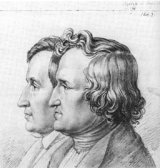Ashputtel Page #2
"Ashputtel" by The Brothers Grimm is a classic fairy tale that narrates the story of a young girl who endures hardship and cruelty at the hands of her stepmother and stepsisters. Left to sleep in the ashes of the fireplace at night and nicknamed 'Ashputtel,' she remains kind and patient. Aided by benevolent birds and magic from her deceased mother, Ashputtel turns her life around dramatically, eventually marrying a prince and leaving her agonizing life behind. The tale carries themes of hope, resilience and the eventual triumph of good over evil.
the unknown maiden, who had been at the feast, had hid herself in the pigeon-house. But when they had broken open the door they found no one within; and as they came back into the house, Ashputtel was lying, as she always did, in her dirty frock by the ashes, and her dim little lamp was burning in the chimney. For she had run as quickly as she could through the pigeon-house and on to the hazel-tree, and had there taken off her beautiful clothes, and put them beneath the tree, that the bird might carry them away, and had lain down again amid the ashes in her little grey frock. The next day when the feast was again held, and her father, mother, and sisters were gone, Ashputtel went to the hazel-tree, and said: ‘Shake, shake, hazel-tree, Gold and silver over me!’ And the bird came and brought a still finer dress than the one she had worn the day before. And when she came in it to the ball, everyone wondered at her beauty: but the king’s son, who was waiting for her, took her by the hand, and danced with her; and when anyone asked her to dance, he said as before, ‘This lady is dancing with me.’ When night came she wanted to go home; and the king’s son followed here as before, that he might see into what house she went: but she sprang away from him all at once into the garden behind her father’s house. In this garden stood a fine large pear-tree full of ripe fruit; and Ashputtel, not knowing where to hide herself, jumped up into it without being seen. Then the king’s son lost sight of her, and could not find out where she was gone, but waited till her father came home, and said to him, ‘The unknown lady who danced with me has slipped away, and I think she must have sprung into the pear-tree.’ The father thought to himself, ‘Can it be Ashputtel?’ So he had an axe brought; and they cut down the tree, but found no one upon it. And when they came back into the kitchen, there lay Ashputtel among the ashes; for she had slipped down on the other side of the tree, and carried her beautiful clothes back to the bird at the hazel-tree, and then put on her little grey frock. The third day, when her father and mother and sisters were gone, she went again into the garden, and said: ‘Shake, shake, hazel-tree, Gold and silver over me!’ Then her kind friend the bird brought a dress still finer than the former one, and slippers which were all of gold: so that when she came to the feast no one knew what to say, for wonder at her beauty: and the king’s son danced with nobody but her; and when anyone else asked her to dance, he said, ‘This lady is my partner, sir.’ When night came she wanted to go home; and the king’s son would go with her, and said to himself, ‘I will not lose her this time’; but, however, she again slipped away from him, though in such a hurry that she dropped her left golden slipper upon the stairs. The prince took the shoe, and went the next day to the king his father, and said, ‘I will take for my wife the lady that this golden slipper fits.’ Then both the sisters were overjoyed to hear it; for they had beautiful feet, and had no doubt that they could wear the golden slipper. The eldest went first into the room where the slipper was, and wanted to try it on, and the mother stood by. But her great toe could not go into it, and the shoe was altogether much too small for her. Then the mother gave her a knife, and said, ‘Never mind, cut it off; when you are queen you will not care about toes; you will not want to walk.’ So the silly girl cut off her great toe, and thus squeezed on the shoe, and went to the king’s son. Then he took her for his bride, and set her beside him on his horse, and rode away with her homewards. But on their way home they had to pass by the hazel-tree that Ashputtel had planted; and on the branch sat a little dove singing: ‘Back again! back again! look to the shoe! The shoe is too small, and not made for you! Prince! prince! look again for thy bride, For she’s not the true one that sits by thy side.’ Then the prince got down and looked at her foot; and he saw, by the blood that streamed from it, what a trick she had played him. So he turned his horse round, and brought the false bride back to her home, and said, ‘This is not the right bride; let the other sister try and put on the slipper.’ Then she went into the room and got her foot into the shoe, all but the heel, which was too large. But her mother squeezed it in till the blood came, and took her to the king’s son: and he set her as his bride by his side on his horse, and rode away with her. But when they came to the hazel-tree the little dove sat there still, and sang: ‘Back again! back again! look to the shoe! The shoe is too small, and not made for you! Prince! prince! look again for thy bride, For she’s not the true one that sits by thy side.’ Then he looked down, and saw that the blood streamed so much from the shoe, that her white stockings were quite red. So he turned his horse and brought her also back again. ‘This is not the true bride,’ said he to the father; ‘have you no other daughters?’ ‘No,’ said he; ‘there is only a little dirty Ashputtel here, the child of my first wife; I am sure she cannot be the bride.’ The prince told him to send her. But the mother said, ‘No, no, she is much too dirty; she will not dare to show herself.’ However, the prince would have her come; and she first washed her face and hands, and then went in and curtsied to him, and he reached her the golden slipper. Then she took her clumsy shoe off her left foot, and put on the golden slipper; and it fitted her as if it had been made for her. And when he drew near and looked at her face he knew her, and said, ‘This is the right bride.’ But the mother and both the sisters were frightened, and turned pale with anger as he took Ashputtel on his horse, and rode away with her. And when they came to the hazel-tree, the white dove sang: ‘Home! home! look at the shoe! Princess! the shoe was made for you! Prince! prince! take home thy bride, For she is the true one that sits by thy side!’ And when the dove had done its song, it came flying, and perched upon her right shoulder, and so went home with her.
Translation
Translate and read this book in other languages:
Select another language:
- - Select -
- 简体中文 (Chinese - Simplified)
- 繁體中文 (Chinese - Traditional)
- Español (Spanish)
- Esperanto (Esperanto)
- 日本語 (Japanese)
- Português (Portuguese)
- Deutsch (German)
- العربية (Arabic)
- Français (French)
- Русский (Russian)
- ಕನ್ನಡ (Kannada)
- 한국어 (Korean)
- עברית (Hebrew)
- Gaeilge (Irish)
- Українська (Ukrainian)
- اردو (Urdu)
- Magyar (Hungarian)
- मानक हिन्दी (Hindi)
- Indonesia (Indonesian)
- Italiano (Italian)
- தமிழ் (Tamil)
- Türkçe (Turkish)
- తెలుగు (Telugu)
- ภาษาไทย (Thai)
- Tiếng Việt (Vietnamese)
- Čeština (Czech)
- Polski (Polish)
- Bahasa Indonesia (Indonesian)
- Românește (Romanian)
- Nederlands (Dutch)
- Ελληνικά (Greek)
- Latinum (Latin)
- Svenska (Swedish)
- Dansk (Danish)
- Suomi (Finnish)
- فارسی (Persian)
- ייִדיש (Yiddish)
- հայերեն (Armenian)
- Norsk (Norwegian)
- English (English)
Citation
Use the citation below to add this book to your bibliography:
Style:MLAChicagoAPA
"Ashputtel Books." Literature.com. STANDS4 LLC, 2025. Web. 22 Jan. 2025. <https://www.literature.com/book/ashputtel_2102>.




Discuss this Ashputtel book with the community:
Report Comment
We're doing our best to make sure our content is useful, accurate and safe.
If by any chance you spot an inappropriate comment while navigating through our website please use this form to let us know, and we'll take care of it shortly.
Attachment
You need to be logged in to favorite.
Log In